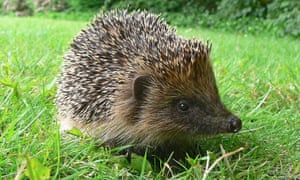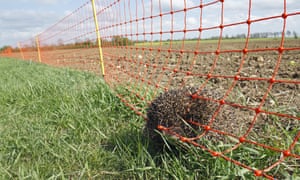https://www.theguardian.com/environment/2017/jul/07/friends-of-the-furze-pig-rspca-urges-public-to-be-hedgehog-aware
During the day they curl up in nests of shredded paper but when night falls those that are well enough scurry and snuffle around the old fish boxes that serve as their temporary homes.
These hedgehogs at the RSPCA’s West Hatch animal centre in Somerset have had a tough time of it. Some have tangled with dogs, strimmers, bonfires, fruit netting or vehicles; others have been brought in as tiny unseeing hoglets, having lost their parents.
The hedgehogs, which arrive here from as far afield as south Wales and Cornwall, will be nursed back to health by vets and animal carers, and released either close to where they were found or into a hog-friendly piece of West Country countryside.
They are – relatively speaking – the lucky ones. Figures out this week show a deeply worrying wider trend.
In the RSPB’s annual garden watch survey, hedgehogs were spotted in fewer gardens for the third consecutive year. One quarter of the 139,000 gardens surveyed did not record a single sighting in the whole of 2016.
The survey, carried out by citizen scientists, echoes what the experts are saying. Nobody knows exactly how many hedgehogs live in Britain but the campaign Hedgehog Street says the number has fallen by 30% to under a million in the past 15 years. In the 1950s, the number was estimated at 36.5m, though the campaign, run by the Hedgehog Preservation Society and the People’s Trust for Endangered Species, accepts this figure may be on the high side.
Hugh Warwick, an ecologist and a leading hedgehog expert, said the beloved creature was facing a crisis in the town and the country. He believes populations of rural hedgehogs may have dropped by up to 75% since the turn of the century. “You might think rural hedgehogs are having a better time,” he said. “They’re certainly not.”
The problems hedgehogs face are clear – traffic, development of green spaces, fragmentation of habitat. The latter is one that could easily be solved, Warwick argues. One square kilometre of the best-quality land is needed for a viable hedgehog population. It is crucial that hedgehogs can move freely around this area, so one relatively simple measure gardeners could take is to cut holes in fences to aid freedom of movement.
Meanwhile, in the countryside the loss of hedgerows – hedgehogs are edge-living creatures – has hit the hogs badly. And there is less food for them. Warwick recently wrote a piece for the Guardian on a study from German entomologists that found that between 1989 and 2013 the biomass of invertebrates – a vital component of the hedgehog diet – had fallen by nearly 80%. “People don’t talk about that,” he said. “It’s too complicated and too scary.”
Warwick said that hedgehogs also had a “complicated” relationship with another British beast, the badger. The two species had got on well since the last ice age, but in recent years a problem has developed.
Warmer, wetter winters and more maize, mean badgers are thriving. This has led to greater competition for invertebrates, which both animals feed on. If the badgers can’t find enough worms, they look elsewhere – and hedgehogs become a protein-rich source of food for them.
Then there is the contact hedgehogs have with humans, which can often lead to injury or death.
RSPCA data reveals that over the past three years, the number of annual hedgehog admissions to its wildlife centres has increased from 1,414 in 2013 to 2,352 in 2016. The expectation is that this pattern will continue this year.
The charity is urging people to become more “hedgehog aware”. Scientific officer Llewelyn Lowen said: “Simple things like checking before you start strimming or using your garden fork, remembering to put sports netting away when it’s not in use and keeping drains covered can really make a difference and help protect the welfare of these iconic creatures.”
Wildlife assistant Lorna Handoll, who was in charge of the West Hatch hogs on Friday, is kept very busy.
The hedgehogs she cares for have different characters. She lifted one out of its fish box because she knew it did not mind the daylight and would not curl up into a ball. She knows to be careful handling another because it fancies itself as an escapologist. A brick has been placed on the lid of its box because of its habit of getting on its surprisingly long hind legs and pushing its way out.
Handoll said it was hard not to become too attached to the hedgehogs she cares for. She admitted she gives some of them names. She recently hand-reared a pair of babies she called Dill and Sage.
“Their eyes were closed when they came to us,” Handoll said. “After two or three days the eyes open.” Dill and Sage have now been released close to Handoll’s home – and she is looking out for them, hoping they will be among the increasingly few that live a long, healthy life.
Since you’re here …
… we have a small favour to ask. More people are reading the Guardian than ever but advertising revenues across the media are falling fast. And unlike many news organisations, we haven’t put up a paywall – we want to keep our journalism as open as we can. So you can see why we need to ask for your help. The Guardian’s independent, investigative journalism takes a lot of time, money and hard work to produce. But we do it because we believe our perspective matters – because it might well be your perspective, too.
I appreciate there not being a paywall: it is more democratic for the media to be available for all and not a commodity to be purchased by a few. I’m happy to make a contribution so others with less means still have access to information.Thomasine F-R.
If everyone who reads our reporting, who likes it, helps to support it, our future would be much more secure.


沒有留言:
張貼留言